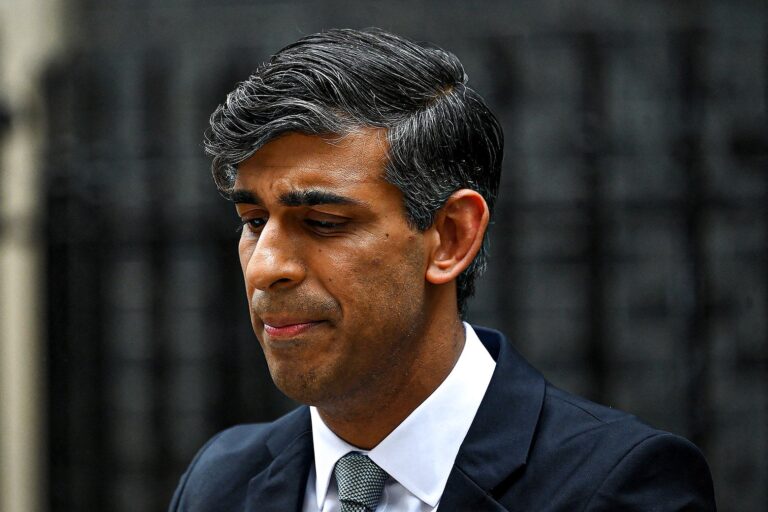Rishi Sunak’s Conservative Party suffered a monumental, era-defining defeat at Thursday’s general election. Here in the U.K., we all knew it was coming. The polls in the run-up to the day itself suggested that the Tories were as much as 20 points behind Labour. But even so, the scale of what happened last night is eye-popping. The Tories won the smallest number of seats since the Tory Party came into being in 1832, a truly staggering failure to drum up enthusiasm for any more Conservative rule. They hold just 121 seats, having lost 252 since the last general election, compared with Labour’s whopping 412. Liz Truss became the first former prime minister in the history of the nation to lose her seat. Eight current Cabinet members also lost their seats, including the defense secretary, the culture secretary, and the leader of the House of Commons. A bloodbath.
It’s a goodbye to Rishi Sunak, and one he doesn’t even seem very unhappy to receive. Sunak has appeared to be campaigning in a half-arsed manner since he called the surprise election six weeks ago. Fair enough, on a personal level. He managed to hold on to his seat as a member of Parliament, but the thinking is that he will want to scuttle away to better paid and less contentious work somewhere like Silicon Valley soon. I wouldn’t want his job at this point either, standing at the helm of the most loathed and humiliated Tory Party of all time.
But getting rid of Sunak feels like a side note to this election’s result. He is just the latest person running the Tory Party show. The point is the defeat of the Tories as a whole. It is a defeat so dramatic that they haven’t just lost power—they have also lost nearly all credibility as a party. It is the death of the Tories, at least for now. So, when we are dancing on their grave, as much of the country is today, what are we saying good riddance to? What is the legacy that the Tory Party of 2010 to 2024 leave behind them?
A long and fitful nightmare, all told. The prime ministership itself has been a revolving door, queasily spinning the incompetent as well as the downright villainous into the top job. David Cameron, Theresa May, Boris Johnson, Liz Truss, and Rishi Sunak. Each of their inadequacies was slightly different: Johnson was an egotistical liar, Truss a blundering clown, Sunak an out-of-touch billionaire, and so on. But together, they all oversaw a grinding degradation of every element of life in the U.K. Where should I start? With our world-beating housing crisis? Shameful levels of child poverty? Record levels of food bank usage? Gas and electricity companies being allowed to hike their prices so high that people can’t afford to heat their homes? Unprecedented wage stagnation? The health service, the justice system, the education system on their knees due to underfunding? Sewage dumped in our water? An ever more hostile environment for immigrants? It is dizzying, trying to take an overview of how much damage the last 14 years of Tory political decisions have done to the country. It has felt so depressing to live in this country that it became dull even to comment on it. Yeah, we know. Everything sucks. We’ve heard.
And now, they’re gone. It remains to be seen just how different Britain will look under Keir Starmer’s Labour, who are a long, long way from the radical-left ideology the party stood for under Jeremy Corbyn just five years ago. And the news from last night was far from all good. Reform, Nigel Farage’s new far-right party, have taken 14 percent of the total vote, despite only gaining four seats. They haven’t crunched the numbers yet, but it is thought that voter turnout was the lowest it’s been in 20 years. Labour’s huge lead could dissolve just as easily as it appeared if they don’t translate their next five years in power into tangible improvements in people’s quality of life, and plenty of those who’ve turned to Labour to save them from Tory Britain might just as easily turn to Reform next time if Labour lets them down. They may have won a huge number of seats back from the Tories, but the number of people who actually voted for them was significantly down from 2019, when Labour lost by hundreds of thousands.
But still, people of my age, early 30s, on the left have never voted in a general election that went even vaguely our way. For the first time ever, we have woken up to something other than a Tory government. Putting hope in politicians to improve our lot has felt like a fool’s game here, but nevertheless, the tentative hope is that things will be at least a little less terrible than they have been in recent times.
At long last, whatever comes next, it feels good, if in a bitter and jaded way, to say goodbye to the Tories. So long, and thanks for nothing.


